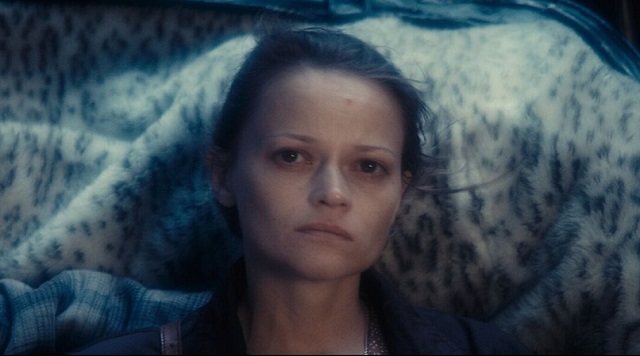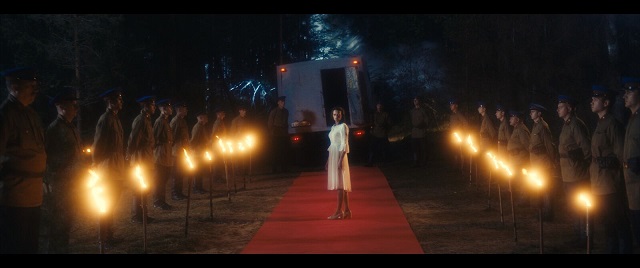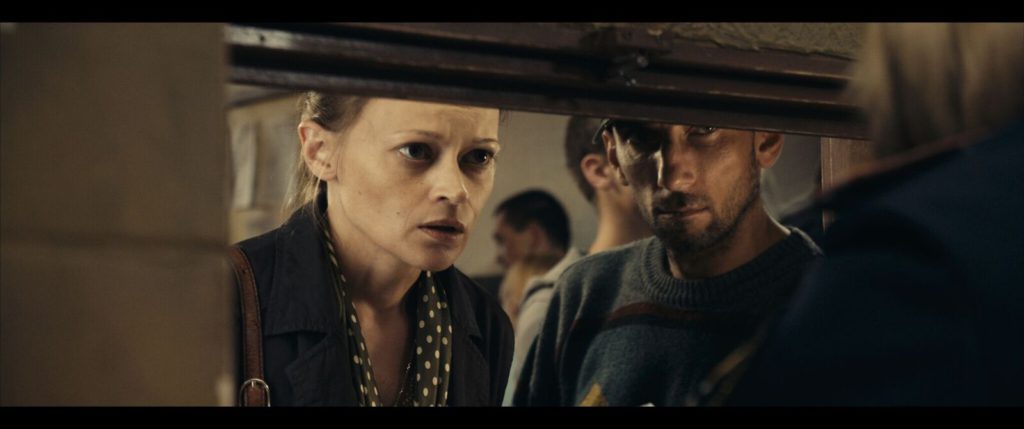
Based in the Dostoevsky’s short story of the same title, Ukrainian director Sergei Loznitsa portraits contemporary Russia as a corrupted and dehumanised society on his third feature, ‘A Gentle Creature,’ telling the ordeal of an ordinary woman living in a small village whom, after a parcel sent to her jailed husband gets returned for no apparent reason and failing to gather any further information, embarks on a journey to the prison where her partner is held.
Her allegorical journey, a labyrinthine descent into social and bureaucratic hell in which she will experience a cycle of abuse and degradation from the shady characters she encounters in her way, paint a grim picture of the moral decay of the country. Lead star Vasilina Mokovtseva gives a remarkably restrained performance focused on the stoicism of her character, who impassibly endures the humiliations thrown at every step of her search for the whereabouts of her husband, passively letting herself being pushed around.

This scathing vision of Russia begins almost ironically at the protagonists’ work place, where she asks for the favour of being replaced for a few days and her boss praises her good fortune for having a relative in prison almost with jealousy, for it will allow her to see the world. The hostility that prevails in everyday interpersonal relationships is well depicted. From the dismissive attitude of the administratives behind the windows she needs to enquire at, to that of the passengers inside the local bus she takes, this is a land where hardly anyone seems to have any kindness or sympathy towards the problems of others, going through the motions of fulfilling their respective allocated roles. Like the passengers in her train to the penitentiary, they sink their sorrows by sharing past war-related tales and vodka-fuelled chants, keeping some sort of pride from the achievements a bygone era whose ghosts seem to be ever present.
But it’s on her arrival to the prison where the extent of her struggle against the state machinery begins to reveal itself. The prison appears as an imposing and impenetrable fortress as the people are forced to join endless queues and fruitless admin rules, yet it is also described with the streetwise philosophy of the cab driver who takes the protagonist from the station as the centre of the town’s economy, where all sort of businesses flourish around the many visitors it receives. The taxi driver also thinks time in jail is a positive thing in for a man that enables him to reconsider the reality of his life. In Loznitsa critical take, the prison (and the whole film) becomes a metaphor for Russia itself, whose development as a nation has turned its citizens into inmates, trapped in an infinite spiral of violence and double-standards where people are constantly violated by each other.

The protagonist will be denied again the chance of letting the parcel there and no explanation will be given, which will lead to a series of opportunistic, shady characters, claiming to know someone with influence who may be able to help, to prey on her misfortune. First of them, the landlady who offers her contacts and cheap accomodation on her establishment, where a sleazy, drunken gathering takes place. Later she will exhaust all institutional paths to claim for an explanation, being systematically ignored. The prison, the police, the human rights association, the mafia…all turn up futile and dangerous efforts, leading to the starting point. From them the film morphs into its surreal conclusion, changing style completely by presenting a grotesque, oneiric banquet where, among the propaganda slogans of the leader, each of the characters contribute sentences praising national glory, followed by a contrasting scene, sort of an emotional culmination, showing further and more harrowing abuse to our protagonist. The director considers this part “a film within the film” as it works as an interlude before returning to the ongoing narrative in the last scene, shaping up an ending as unexpected, as thought-provoking.
Loznitsa, highly regarded for his prolific and rigorous documentary works, the latest of which ‘Austerlitz’ and ‘The Event’ have been piling up awards around the world, takes his time when he directs fiction, paying painstaking attention to detail and showing and impressive command of each craft involved; helped by his habitual cinematographer, Oleg Mutu, who repeats in ‘A Gentle Creature’ what he did in ‘My Joy’ (2010) recreating the atmospheres of a journey into the darkest core of a country stuck in time.
Presented in last year’s official competition at Cannes, ‘A Gentle Creature’ is an impressively multilayered film that demands your full intellectual investment in order to reveal its many rewards. Its formal excellence and complex social and political reflections confirm Sergei Loznitsa as one of Today’s most essential auteurs from the Post-Soviet states. (9/10)
A GENTLE CREATURE is released in UK cinemas 13th April
